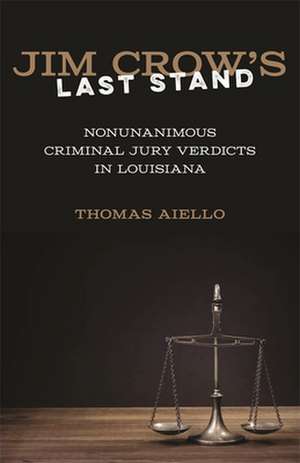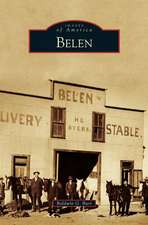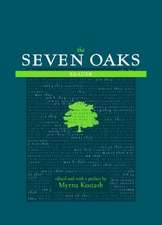Jim Crow's Last Stand: Nonunanimous Criminal Jury Verdicts in Louisiana
Autor Thomas Aielloen Limba Engleză Hardback – 3 mai 2015
The nonunanimous jury-verdict law originally allowed a guilty verdict with only nine juror votes, funneling many of those convicted into the state's burgeoning convict lease system. Yet the law remained on the books well after convict leasing ended. Historian Thomas Aiello describes the origins of the statute in Bourbon Louisiana-a period when white Democrats sought to redeem their state after Reconstruction-its survival through the civil rights era of the 1950s and 1960s, and the Supreme Court's decision in Johnson v. Louisiana (1972), which narrowly validated the state's criminal conviction policy.
Spanning over a hundred years of Louisiana law and history, Jim Crow's Last Stand investigates the ways in which legal policies and patterns of incarceration contribute to a new form of racial inequality.
| Toate formatele și edițiile | Preț | Express |
|---|---|---|
| Paperback (1) | 154.84 lei 3-5 săpt. | |
| Louisiana State University Press – 31 aug 2019 | 154.84 lei 3-5 săpt. | |
| Hardback (1) | 286.45 lei 3-5 săpt. | |
| Lsu Press – 3 mai 2015 | 286.45 lei 3-5 săpt. |
Preț: 286.45 lei
Nou
Puncte Express: 430
Preț estimativ în valută:
54.81€ • 57.38$ • 45.35£
54.81€ • 57.38$ • 45.35£
Carte disponibilă
Livrare economică 15-29 martie
Preluare comenzi: 021 569.72.76
Specificații
ISBN-13: 9780807158999
ISBN-10: 0807158992
Pagini: 184
Dimensiuni: 144 x 225 x 20 mm
Greutate: 0.37 kg
Ediția:
Editura: Lsu Press
ISBN-10: 0807158992
Pagini: 184
Dimensiuni: 144 x 225 x 20 mm
Greutate: 0.37 kg
Ediția:
Editura: Lsu Press
Notă biografică
Descriere
Descriere de la o altă ediție sau format:
Louisiana's non-unanimous jury-verdict law permitted juries to convict criminal defendants with only nine, and later ten, out of twelve votes. This updated edition of Jim Crow's Last Stand unpacks the origins of the statute, traces its survival through the civil rights era, and ends with the successful effort to overturn the practice.
Louisiana's non-unanimous jury-verdict law permitted juries to convict criminal defendants with only nine, and later ten, out of twelve votes. This updated edition of Jim Crow's Last Stand unpacks the origins of the statute, traces its survival through the civil rights era, and ends with the successful effort to overturn the practice.









